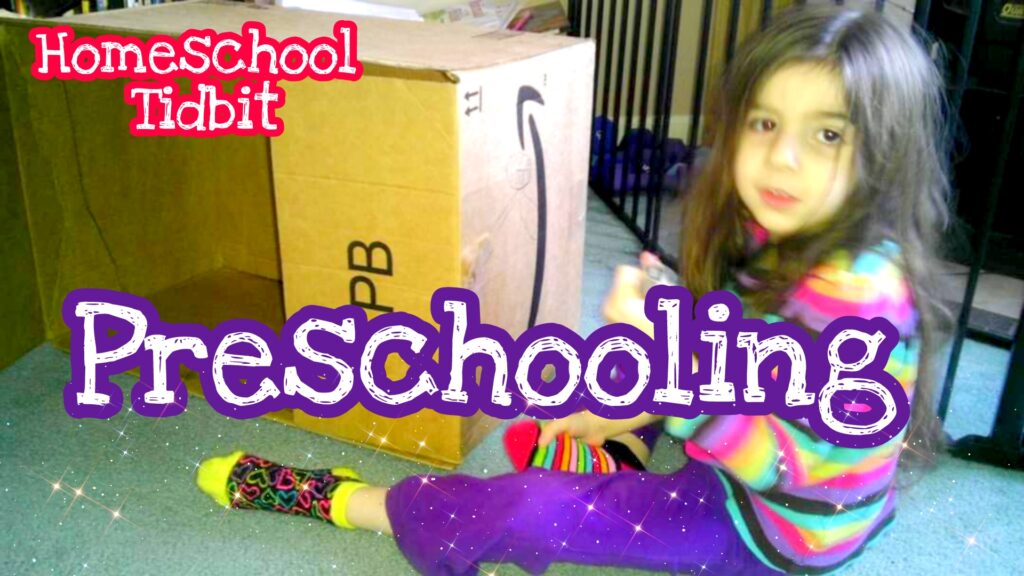Homeschool Tidbits: Preschooling – On Homeschooling Littles
July 29, 2022

Welcome to Build Your Library’s Homeschool Tidbits: Episode 24 – Preschooling: On Homeschooling Littles. In this weekly video series, I will delve briefly into a topic related to homeschooling and will share some of my knowledge and expertise as a long-time homeschooling mother of 4 children. Three of whom have graduated high school and one who is a new college graduate!
I talk to a lot of homeschoolers. As a parent who has been in this game a long time, I’ve seen a lot of new homeschool parents looking for advice and curriculum ideas for their very young children. There seem to be two schools of thought here. One is that early learning is important and that you NEED some sort of structured learning time with a preschool-age child. The other is that you don’t need to do anything with a young child, they will just absorb information like a sponge without any effort on your part.
Early Learning
My opinion on this topic is this, is you really don’t need a curriculum for a preschool-aged child. However, you might want to make room in your day for some structured activities. Small children do NOT need seatwork, lesson plans, or anything fancy. If you are a new homeschool parent on a budget, this is great news for you! All you really need are art supplies, a place for outdoor play, and a library card.
Young children might not need any formal lessons, but they do need your time and attention! When I first discovered homeschooling, my oldest was only 3. But she was eager to learn, so we went all in. Workbooks, math curriculum, phonics lessons! She was happy, so we went with it.
Then my twins came along. While Sarah was an eager student, they were not interested in formal learning. When they were 4, I attempted to pull them into some learning activities. It didn’t go well. One twin was happy to go along with my lessons, but the other was not interested at all. After a year or so of struggling to keep the twins together, I gave my less eager twin some slack. They caught up with each other by the time they were 8. And that less than eager kid? She’s the twin who went to college.
I didn’t even start formal lessons with my youngest until she was 6. And then it was very gentle. I have zero regrets about that. I learned from previous experiences that formal learning before then isn’t necessary. Every child learns on their own timetable. Some are eager to learn and will ask for lessons while some won’t and that is OK! They all catch up later. A child who is forced to do schoolwork before they are ready will grow to hate learning. Giving them time to grow and learn at their own pace will allow them to flourish and grow into lifelong learners.
Pre-Homeschool
I think there are two typical scenarios when it comes to homeschooling littles. On the one hand are the eager parents who have just discovered homeschooling. They are very excited to get started with their 3–4-year-old. On the other hand, are parents who already have school-age children and have littles that want to “do school” like their siblings.
If you are the first parent, I would encourage you to take a year or two for self-education. Learn about homeschooling, learning styles, and different homeschooling methods. You may even deep dive into a topic you have always been interested in studying! This will give you time to really learn your personal teaching and learning style. It will also give your child time to grow a bit before you start formal lessons.
If you have a younger sibling that just wants to tag along, go ahead and let them. They can listen in on their older sibling’s lessons, and if they want to do seat work, let them color or draw pictures.
Other things you can do with very young children:
Art
Little kids love art because it gives them the opportunity to express themselves in a different way. Make sure you have plenty of art supplies on hand and don’t be afraid of a little mess now and then.
Gentle Math
Don’t worry about buying a math curriculum for a preschooler. They are completely unnecessary. The only math skills your child needs to learn at this age are counting and calendar skills. You can work on both of these in day-to-day conversation and activities. Talk about what day it is every morning at breakfast, the changing of seasons, important holidays, and birthdays. All of this can be learned in conversation. Keep a calendar in a prominent place and point to it when you are talking about the day each morning.
Count EVERYTHING. How many potatoes do you need for dinner? How many flowers can you count on your walk? Or even how many grapes do they want for lunch? You get the idea. You can even teach them some basic adding and subtracting. I gave you 6 grapes, and you ate one! How many do you have left now?
Reading Together
Building a love of reading starts here. Set aside time each day for reading together. Young children might not have the attention span for chapter books, but you can read picture books together!
Read for 20 minutes every day. That’s two picture books daily! This is how you build their vocabulary and teach them about story structure, the alphabet, and early reading skills. Make it a special part of your day and they will come to love reading!
Get Outside
Take walks together, play in the yard, look for bugs, and cool rocks, and talk about the different kinds of flowers and trees in your neighborhood. Go birdwatching at your local park, take them for hikes and talk about what you see. Bring along a sketchbook and pencils and let them draw something they see on your outdoor adventure!
Pretend Play
Give them things for dress-up play, and plenty of imaginative toys like dolls, building blocks, action figures, and puppets. Let their imagination soar! My oldest used to come up with such elaborate pretend play. She would even script everything because she wanted things to be a certain way. She made up songs and tried to teach them to us, put on puppet shows, and invented fun little stories. I’m not surprised she grew up to be a writer. Pretend play is so important and if they let you join in, just pretend it’s improv. The rule of the game is “Yes, AND…”
With small children, I don’t think you need to worry about formal learning. Because children this age are sponges, they will learn so much just by spending time with you, living life, and playing. For a small child, play IS learning. Give them time to grow and you will find homeschooling easier when they are school age.
Coming up next…
I hope you found this Tidbit helpful! Come back next week for more homeschooling inspiration!
Until then, happy reading!
See Also:
Charlotte Mason in the Secular Homeschool
A Literary Education book
About Build Your Library
Homeschool Tidbits: Build Your Library’s Weekly Video Blog Series
 Emily Cook is the author and creator of the secular homeschool curriculum Build Your Library, a literature-based K-12 program infused with the teachings of Charlotte Mason. She writes full-year lesson plans as well as shorter topical unit studies. Emily has been homeschooling her four children in Southern NH for 21 years. She is passionate about reading aloud to children of all ages and loves to share her love of literature with others. She and her family also make incredibly dorky videos about homeschooling, books, and more on Youtube at ARRRGH! Schooling. You can follow her on Facebook, Twitter, and Pinterest. You can also check out her author page on Amazon.
Emily Cook is the author and creator of the secular homeschool curriculum Build Your Library, a literature-based K-12 program infused with the teachings of Charlotte Mason. She writes full-year lesson plans as well as shorter topical unit studies. Emily has been homeschooling her four children in Southern NH for 21 years. She is passionate about reading aloud to children of all ages and loves to share her love of literature with others. She and her family also make incredibly dorky videos about homeschooling, books, and more on Youtube at ARRRGH! Schooling. You can follow her on Facebook, Twitter, and Pinterest. You can also check out her author page on Amazon.
